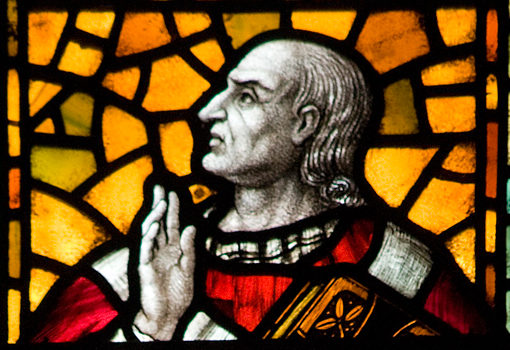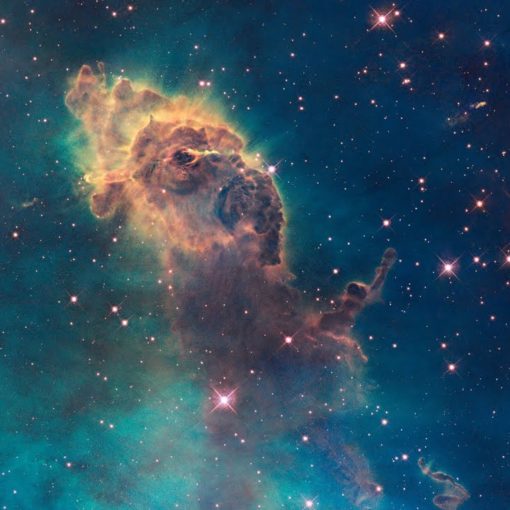Introduction
This argument is based upon an argument originally proposed by the famous mathematician and Christian apologist Gottfried Leibniz. It is a type of cosmological argument that does not invoke the beginning of the universe, but rather the explanatory structure of the universe.
Definitions
- Necessity: A being’s existence is metaphysically necessary if it cannot fail to exist; the being exists in all logically possible worlds. The explanation of the existence of a necessary being is in the necessity of its own nature.
- Contingency: A thing is contingent if it could exist but it could have failed to exist. For example, the Earth’s existence is contingent. It exists but it could have failed to exist (indeed, at one point the Earth didn’t exist). The explanation of a contingent thing’s existence is an external cause.
Outline of the premises
- Everything that exists has an explanation for its existence, either in the necessity of its own nature or in an external cause (i.e. it is contingent).
- If the universe has an explanation for its existence, that explanation is what we call God
- The universe is an existing thing.
- From 1 and 3 it follows: The universe has an explanation of its existence
- From 2 and 4 it follows: The explanation for the existence of the universe is God
Let’s go through each premise one-by-one.
Everything that exists has an explanation for its existence
- This is formulation of what is commonly known as the principle of sufficient reason (PSR) which undergirds all of scientific and philosophical inquiry. Both fields have an insatiable thirst for explanation. To deny this principle would be to take an immensely anti-intellectual position, that is, that some things exist for absolutely no reason.
- OBJECTION: If everything has an explanation for its existence, then surely God has an explanation for his existence. But, nothing is greater than God so he cannot have an explanation and therefore, P1 is false.
- RESPONSE: God is not exempt from the need of an explanation. There are two types of beings in things, necessary ones and contingent ones. A necessary being is one who exists by a necessity of its own nature, that is, it is impossible for this entity to fail to exist. A contingent being is one whose exists in virtue of an external cause. It cannot exist without depending on something else for its existence. God’s existence is one of necessity.
- OBJECTION: This is true for everything in the universe but it is not true of the universe.
- RESPONSE: This is somewhat akin to special pleading). That is, a premise is accepted until the conclusion is reached and then dismissed. To dismiss the PSR once one reaches the destination of the universe would be arbitrary and even unscientific. The entire field of cosmology would become a frivolous pursuit. The burden of proof is assumed to demonstrate why the universe in particular is unique in its exemption from the PSR. Remember, as demonstrated in the previous objection, the theist is not exempting God from the PSR.
- OBJECTION: The universe cannot have an explanation. The universe is everything that exists. To have an explanation, there would have to be a state of affairs wherein the universe did not exist, but, that would be nothingness. Therefore, the universe simply exists inexplicably.
- RESPONSE: This is simply question-begging. The objection presupposes naturalistic atheism that is, the physical world is a maximal description of reality. Also, this objection is an implicit assertion of the next premise in the argument.
If the universe has an explanation for its existence, that explanation is what we call God
- This statement has the same logical content as a common atheist response that has already been previewed: “If atheism is true, then the universe has no explanation”. Since naturalism assumes that there is no reality outside of the material universe, then the state of affairs where there was nothingness from which the universe came into being necessitates that the occurrence is inexplicable. Notice how the same truth value applies to the statement “If the universe has an explanation, then atheism is false.” which is essentially identical to (2). Therefore, by affirming the inexplicable existence of the universe, the naturalist also affirms the truth value of (2).
- By the nature of the case, (2) stands on its own right as plausible, independent of implicit admittance from the atheist. Consider the composition of the universe: all of matter, energy, space, and time. If there were an explanatory cause of the universe, it must be transcendent to these entities. A timeless, spaceless, immaterial, and personal entity that is causally active coincides nicely with the classical understanding of God.
- OBJECTION: The universe does have an explanation: the necessity of its own being.
- RESPONSE 1: Evidence against the universe’s necessity: It is logically possible that the composition of the universe could have been an entirely different set of quarks/strings/units. For example, think about your chair. Is it possible that your chair could have been made out of ice? Not that your chair would look identical to the way it is now and just composed out of ice, rather, your actual chair. The answer is no. You would have a different chair, an ice chair. Likewise, the universe could have been composed out of a different set of quarks/units and it would have been a different universe even if it were in the same shape. Since it is not necessary that our universe is made out of the current arrangement of quarks/units, then the universe cannot exist necessarily.
- RESPONSE 2: Evidence for the universe’s contingency: The BVG Theorem demonstrates that any universe that is on average in a state of expansion cannot be past eternal. However, necessary beings are entities which are eternal in nature and have no beginning to their existence (e.g. Suppose numbers are necessary. When did 1 begin to exist? Before humanity existed, there was still one sun in this solar system, only one universe, etc.) This counter-argument can be summarized as follows:
- (1) – If a thing is necessary, then it is eternal.
- (2) – The universe is not eternal
- (3) – The universe is not a necessary thing [1,2 modus tollens]
- (4) – Everything is either a necessary thing or a contingent thing. [PSR]
- (5) – The universe is a contingent thing [3,4 disjunctive syllogism]
- OBJECTION: Part of the universe is necessary and the rest of it is contingent.
- RESPONSE: There is currently no evidence to support that any kind of matter/energy exists by necessity. Furthermore, there does not seem to be a place for any kind of necessarily existing matter. As the expansion of the universe is traced backwards, a singularity is reached wherein the universe is so small, not even subatomic particles could exist.
- OBJECTION: The universe is contingent, but, it is necessary that something For example, It is necessary that a geometric shape has a number of sides, but, no particular number is necessary
- RESPONSE 1: It does not seem clear that it is logically necessary that something exists. There is not any logical contradiction in a possible world wherein no contingent things exist.
- RESPONSE 2: Absurdity ensues. There is no combination of propositions about the non-existence of various things that would plausibly entail that anything exists. For example, conjoining the propositions “cows do not exist, spaghetti does not exist, protons do not exist, etc.” out to every broadly logical entity except for a purple velociraptor does not necessitate that such a velociraptor exists. The same goes for a unicorn, a fairy, or a universe.
- OBJECTION: God cannot be the cause of the universe because you define God as necessary. Necessary causes bring about necessary effects. Therefore, either the universe is necessary because God is necessary or the universe is contingent and God, being necessary, is not the explanation.
- RESPONSE: It does not seem to be apparent that necessary beings produce necessary effects necessarily. Even so, God, as a personal being, is endowed with volition. While his existence is necessary, and the case could be made that his knowledge of all possible worlds is also necessary, the actualization of any particular world is contingent upon what he freely wills.
The universe is an existing thing
- This premise is included to complete the logical validity of the argument. Even if someone were to object that the universe does not exist, what cannot be denied is at least the illusion of the universe’s existence which is still encompassed by the PSR and requires an explanation. Any further objection would simply shift the conversation into epistemology. Additionally, the intellectual price of denying the existence of the universe is so high that if the opponent is forced to reject (3) in order to avoid the theistic conclusion, then this argument can be said to have been successful.
Christian Application
All of the properties of this necessary, self existent being which upholds and sustains the universe in existence are encompassed by the Biblical description of God. (All verses are from the English Standard Version).
Exodus 3:13-14
Then Moses said to God, If I come to the people of Israel and say to them, “The God of your fathers has sent me to you,” and they ask me, “What is his name?” what shall I say to them? God said to Moses, “I AM THAT I AM”
John 1:1-3
In the beginning was the Word, and the Word was with God, and the Word was God. He was in the beginning with God. All things were made through him, and without him was not any thing made that was made.
Acts 17:23-28
For as I passed along and observed the objects of your worship, I found also an altar with this inscription, “To the unknown god.” What therefore you worship as unknown, this I proclaim to you. The God who made the world and everything in it, being Lord of heaven and earth, does not live in temples made by man, nor is he served by human hands, as though he needed anything, since he himself gives to all mankind life and breath and everything. And he made from one man every nation of mankind to live on all the face of the earth, having determined allotted periods and the boundaries of their dwelling place, that they should seek God, and perhaps feel their way toward him and find him. Yet he is actually not far from each one of us, for “In him we live and move and have our being”
Colossians 1:15-17
He is the image of the invisible God, the firstborn of all creation. For by him all things were created, in heaven and on earth, visible and invisible, whether thrones or dominions or rulers or authorities – all things were created through him and for him. And he is before all things, and in him all things hold together.
Nehemiah 9:6
You are the Lord, you alone. You have made heaven, the heaven of heavens, with all their host, the earth and all that is on it, the seas and all that is in them; and you preserve all of them; and the host of heaven worships you.
1 Corinthians 8:5-6
For although there may be so-called gods in heaven or on earth – as indeed there are many “gods” and many “lords” – yet for us there is one God, the Father, from whom are all things and for whom we exist, and one Lord, Jesus Christ, through whom are all things and through whom we exist.
Hebrews 1:1-3
Long ago, at many times and in many ways, God spoke to our fathers by the prophets, but in these last days he has spoken to us by his Son, whom he appointed the heir of all things, through whom also he created the world. He is the radiance of the glory of God and the exact imprint of his nature, and he upholds the universe by the word of his power.
Concluding Thoughts
The doctrine of Divine Aseity, i.e. God’s self-existence/necessity, is more than just an Ivory Tower type of concept. It has quite practical applications.
First, God should be our ultimate concern. God is the metaphysical necessity, the greatest conceivable being above which no greater can be conceived as St. Anselm so aptly described. When one begins to understand this fully, one quickly realizes that substituting anything else for God as the ultimate concern of life is quite literally idolatry. This is the purpose of the first of the Ten Commandments: “thou shalt have no other gods before me”.
Second, this removes any place for selfishness. The reality of our radical contingency upon God makes the concept of living for the self absolutely, entirely absurd. Thus, it is from these two considerations that the majority of sin is produced. When we replace God as our ultimate concern in life and turn all attention to ourselves, we have violated the first and greatest commandment to love the Lord our God with all of our mind, soul, and strength (Matthew 22:37).
Further Reading:
William Lane Craig’s Directory: http://www.reasonablefaith.org/Leibniz-Contingency-Argument
Moreland, James P., and William L. Craig. “The Existence of God”. Philosophical Foundations for a Christian Worldview. Downers Grove, IL: InterVarsity, 2003. 463-82. Print.
Pruss, Alexander R. “The Leibnizian Cosmological Argument“. The Blackwell Companion to Natural Theology. Chichester, U.K.: Wiley-Blackwell, 2009. 24-100. Print.
Maverick Christian: http://www.maverick-christian.org/2012/05/leibnizian-cosmological-argument-for.html
J.W. Wartick: http://jwwartick.com/2010/10/06/l-c-a/








